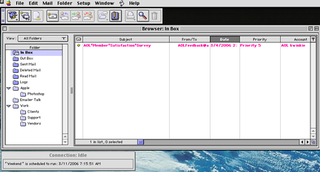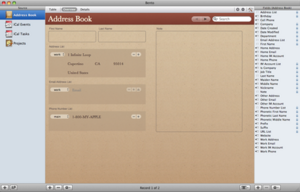
QuarkXPress is a desktop publishing software for creating and editing complex page layouts in a WYSIWYG environment. It runs on macOS and Windows. It was first released by Quark, Inc. in 1987 and is still owned and published by them.

Adobe FrameMaker is a document processor designed for writing and editing large or complex documents, including structured documents. It was originally developed by Frame Technology Corporation, which was bought by Adobe.

Cyberdog was an OpenDoc-based Internet suite of applications, developed by Apple Computer for the Mac OS line of operating systems. It was introduced as a beta in February 1996 and abandoned in March 1997. The last version, Cyberdog 2.0, was released on April 28, 1997. It worked with later versions of System 7 as well as the Mac OS 8 and Mac OS 9 operating systems.

Adobe PageMaker is a discontinued desktop publishing computer program introduced in 1985 by the Aldus Corporation on the Apple Macintosh. The combination of the Macintosh's graphical user interface, PageMaker publishing software, and the Apple LaserWriter laser printer marked the beginning of the desktop publishing revolution. Ported to PCs running Windows 1.0 in 1987, PageMaker helped to popularize both the Macintosh platform and the Windows environment.
FileMaker is a cross-platform relational database application from Claris International, a subsidiary of Apple Inc. It integrates a database engine with a graphical user interface (GUI) and security features, allowing users to modify the database by dragging new elements into layouts, screens, or forms. It is available in desktop, server, iOS and web-delivery configurations.

iLife is a discontinued software suite for macOS and iOS developed by Apple Inc. It consists of various programs for media creation, organization, editing and publishing. At various times, it included: iTunes, iMovie, iPhoto, iDVD, iWeb, and GarageBand. Only iMovie and GarageBand remain and are now freely available on Apple's Mac App Store. iDVD and iWeb have been discontinued while iTunes and iPhoto have been succeeded by Music and Photos respectively.
MacWrite is a WYSIWYG word processor application released along with the first Apple Macintosh systems in 1984. Together with MacPaint, it was one of the two original "killer applications" that propelled the adoption and popularity of the GUI in general, and the Mac in particular.

AppleWorks is an integrated office suite containing a word processor, database, and spreadsheet. It was developed by Rupert Lissner for Apple Computer, originally for the Apple II platform and launched in 1984, and was later reworked for the Macintosh platform.
Claris International Inc., formerly FileMaker Inc., is a computer software development company formed as a subsidiary company of Apple Computer in 1987. It was given the source code and copyrights to several programs that were owned by Apple, notably MacWrite and MacPaint, in order to separate Apple's application software activities from its hardware and operating systems activities.
Lasso is an application server and server management interface used to develop internet applications and is a general-purpose, high-level programming language. Originally a web datasource connection tool, for Filemaker and later included in Apple Computer's FileMaker 4.0 and Claris Homepage as CDML, it has since evolved into a complex language used to develop and serve large-scale internet applications and web pages.

iWork is an office suite of applications created by Apple Inc. for its macOS and iOS operating systems, and also available cross-platform through the iCloud website.

Logic Pro is a digital audio workstation (DAW) and MIDI sequencer software application for the macOS platform. It was originally created in the early 1990s as Notator Logic, or Logic, by German software developer C-Lab which later went by Emagic. American technology company Apple acquired Emagic in 2002 and renamed Logic to Logic Pro. It is the second most popular DAW – after Ableton Live – according to a survey conducted in 2015.

Claris Emailer is a discontinued e-mail client for the classic Mac OS created by Fog City Software. It was bought and marketed by the Apple Inc. subsidiary Claris. In addition to internet email, it supported sending and receiving email to online services such as AOL, Applelink, Compuserve. It was the only third-party e-mail client licensed to directly access AOL e-mail. Additionally, it was one of the first commercial applications to support the Internet Config preferences management system.
XTND was a document import/export system developed by Claris for their products on the Apple Macintosh. Products supporting XTND placed an additional popup menu in the open and save dialogs, allowing users to read and write documents of any supported format. The name is a four-letter contraction of extend, the Mac using four-letter identifiers in its system resource files.

Aperture was an image organizer developed by Apple for the macOS operating system. It was first released in 2005 and was discontinued in 2015. The software handled a number of tasks common in post-production work such as importing and organizing image files, applying corrective adjustments, displaying slideshows, and printing photographs.
Timbuktu is a discontinued remote control software product originally developed by WOS Datasystems. Remote control software allows a user to control another computer across the local network or the Internet, viewing its screen and using its keyboard and mouse as though sitting in front of it. Timbuktu is compatible with computers running both Mac OS X and Windows.

Claris Home Page was one of the earliest true WYSIWYG HTML editors, developed from 1994 on. The project was code-named Loma Prieta. Claris purchased it from San Andreas Systems, reworked it to use the user interface common to all their products, and released it in 1996.

The Macintosh is a family of personal computers designed, manufactured, and sold by Apple Inc. since January 1984.

RagTime is a frame-oriented business publishing software which combines word processing, spreadsheets, simple drawings, image processing, and charts, in a single document/program. It is often used to create forms, reports, documentation, desktop publishing, and in office environments. Typical users are business clients, educational institutions, administrations, architects, and also private users.










